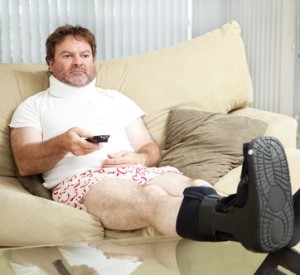People who suffers from mental health conditions such as anxiety, depression, and post-traumatic stress disorder (PTSD) have often been treated unfairly. In the past, people suffering from these condition were often teased and ridiculed.
Fortunately, a better understanding of mental health conditions and how to treat these conditions has allowed our society to work toward moving past this unfair treatment. But, there are some areas of the law where people suffering from mental health conditions still receive unfair treatment. One of those areas is Georgia’s workers’ compensation law. As the law in Georgia currently stands, an employee can develop terrible PTSD from an undisputed work-related incident and still not be eligible to receive workers’ compensation benefits.
Why do Georgia’s workers’ compensation laws treat employees with mental health injuries unfairly?
Why does this happen? Because Georgia’s workers’ compensation laws still operate under the idea that mental health conditions should not be covered unless they are caused by a physical injury. In 1998, the Georgia Supreme Court decided that the word “injury” in the Georgia Workers’ Compensation Act only meant a physical injury and did not mean a mental injury. The case making this decision involved a park maintenance supervisor who worked 100 hours over 5 days to help pull over 400 caskets and 18 bodies out of the flooded Flint River. He developed PTSD and was ultimately unable to continue working.
Nevertheless, the Georgia Supreme Court decided that any changes in the workers’ compensation law to cover mental injuries had to be made by the Georgia legislature. The legislature has not made any changes in the law to expand coverage for mental injuries since that time. So, Georgia still has workers’ compensation rules that only cover mental health conditions that are caused by a physical injury.
 Why does it matter whether there is a physical injury?
Why does it matter whether there is a physical injury?
This rule leads to absurd results and incredible unfairness. For example, consider a convenience store clerk. A definite risk of working as a convenience store clerk is robbery. A convenience store clerk who is screamed at, tied up, and held at gunpoint for hours but not physically injured would not be eligible for workers’ compensation benefits for PTSD or any other mental health condition. Why? Because there was no physical injury.
However, a convenience store clerk who was punched, pushed to the ground, or struck with an object would probably be able to get medical treatment through workers’ compensation. Why? Simply because there was a physical injury as part of the work-related incident.
Does it really make any sense that a physical injury is required to cause a mental health condition? To me, it makes absolutely no sense. Certainly, physical injuries and the pain they cause can often lead to depression and other mental health conditions. But many people with mental health conditions develop those conditions without any connection to a physical injury.
So, what is the reason for only covering mental health conditions when there is a physical injury? Frankly, I don’t see a good reason.
Do other states allow employees to receive workers’ compensation benefits for mental injuries?
Yes. Many other states do allow injured workers to receive workers’ compensation benefits for mental injuries even when there is no accompanying physical injury. Georgia’s neighbor state South Carolina is among the states that allow recovery of benefits. The Veterans Administration has also recognized the reality of PTSD from mental stress and pays veterans benefits for it.
Each states workers’ compensation laws are different. Unfortunately, Georgia and some other states still discriminate against employees who suffer mental injuries at work. Hopefully, Georgia’s laws will be changed to recognize the progress that has been made in the area of mental health conditions and their treatment. Until that happens, employees in Georgia who are exposed to extremely stressful situations at work and develop PTSD or another mental health condition will continue receive unfair treatment.









